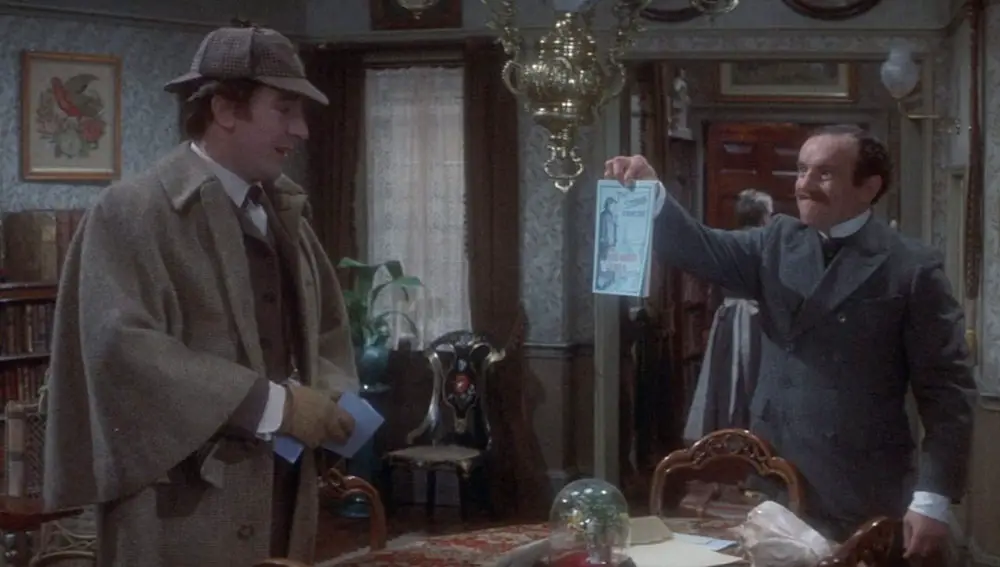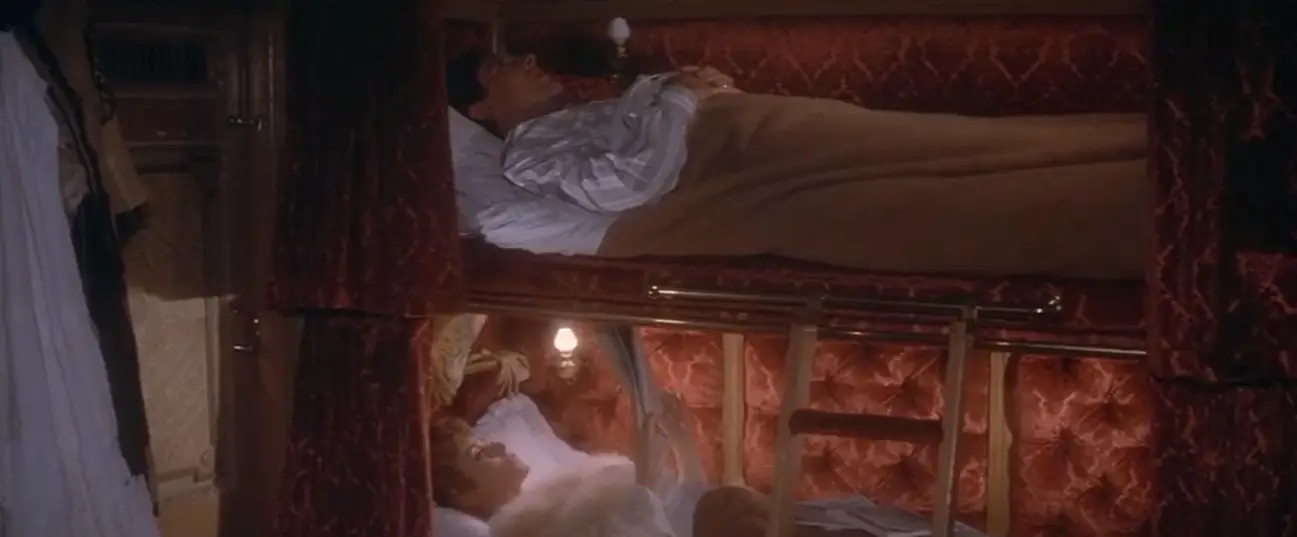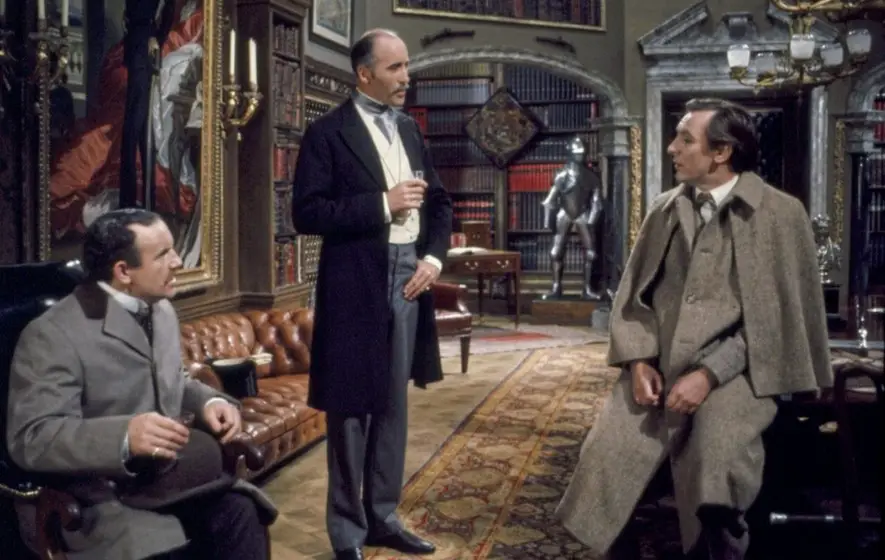Billy Wilder’s The Private Life of Sherlock Holmes is considered by many to be his last “great” movie; Wilder would go on to make only four more movies. Since I haven’t much of the master’s later work, I can’t say if I agree. But I can say, after watching The Private Life of Sherlock Holmes twice in one week, it proves that at 64 years old and after some twenty films, the old man still had it in him.
Co-written by his long-time collaborator I.A.L. Diamond, The Private Life of Sherlock Holmes is a passion project for Wilder. The director, known for being a cynical sentimentalist, appeared to have a soft spot for Doyle’s enduring creation. Sadly, the film also stands as his one great heartbreak. Originally envisioned as a three-hour symphonic tale of four cases, the studio truncated it into two hours, dealing with only two cases.

The result is hardly what Wilder and Diamond had intended but is no less fascinating. Unfortunately, the first thirty minutes of The Private Life of Sherlock Holmes are so good, nay great, that it is easy to be somewhat disappointed by the rest of the movie. Indeed, many people complain that after the first stellar thirty minutes, it becomes just “another” Sherlock Holmes story—a strange complaint if you are, like me, somewhat of a Holmesian.
Wilder and Diamond used The Scandal of Bohemia as an inspiration for their original tale, which involves a troupe of circus-performing little people, the Loch Ness monster, espionage, a rumor that Sherlock (Robert Stephens) and Watson (Colin Blakely) are more than partners-started by Sherlock, and a strange Belgian woman with amnesia Gabrielle Valladon (Genevieve Page).
The beginning involves Sherlock and Watson anonymously invited to the ballet “Swan Lake,” starring the great Madame Petrova (Tamara Toumanova) in her final performance. However, Sherlock believes it to be a plot to kill him of boredom. Soon the duo discovers the invitations were sent by Madame Petrova’s interpreter Rogozhin (Clive Revill), who invites them backstage for a private audience wherein Watson flirts shamelessly with the dancers. Madame Petrova, meanwhile, proposes an indecent proposal to Sherlock.
A comedy of manners, the beginning of The Private Life of Sherlock Holmes is more than the work of a comic mastermind, filled with visual gags, meticulous comic timing, and double entendres; it is a brilliant sleight of hand by Wilder and Diamond. It is Wilder and Diamond’s way of priming you for the rest of the movie. Sherlock himself says as much towards the end. “It’s exactly like Swan Lake.”
It is also one of the early instances of playing with the meta-text of Doyle’s stories. Holmes castigates Watson for his misrepresentations of himself and what he does. “You’ve saddled me with this improbable costume, which the public now expects me to wear.” Watson counters, “That’s not my doing. Blame it on the illustrator.”
But, what the opening parallels — besides the second case of the strange Belgian woman serendipitously dropped off at the doorstep of 221B Baker street by a cabbie after fishing her out of the Thames in search of her engineer husband –is something much more complex. The Private Life of Sherlock Holmes is one of the early attempts to hint and imply Sherlock is gay. The film is ambiguous, but Wilder later in life admitted he regretted not making Sherlock unambiguously gay.
But it’s not just his sexuality that Wilder and Diamond prick at, but his attitude toward women and, more importantly, himself. I prefer Wilder’s ambiguity because one of the fascinating aspects of Stephens’s Holmes is not that we know or think he’s gay, or at the very least, on the spectrum of queerness. But it becomes undeniable that Sherlock doesn’t know what he is. Moreover, his attitude toward women, “I don’t hate them. I merely distrust them,” is even more complex when you realize that he believes Valladon, even while distrusting her.

Embroidered in all this is Wilder and Diamond’s sly pinpricking of Sherlock’s flawed mantra of logic over emotion. It becomes evident that the thing that hobbles Sherlock isn’t that he is an addict or hates or doesn’t hate women. But the common cause of all of this is his fear of himself. But why he runs from himself and why he plays so hard at being insensitive when he is, in fact, acutely sensitive is part of what makes the great detective so compelling.
Stepehens’s Holmes is as conflicted as he is inscrutable. While I believe that Jeremy Brett represents the pinnacle of Holmes, the more I ponder Stephens, the more he ties with Christopher Plummer in Murder by Decree for a damn close second. His Holmes is cool, detached, logical, and deeply wounded, as evident by his addiction.
While Holmes claims it is purely to keep his mind occupied when he becomes bored, the final scene reveals that his addiction, like all addictions, stems from something more profound. The scene in which he talks about his history with women with Madame Valladon is fascinating because Stephens’s face is so unreadable, as equally unreadable as Page’s Valladon’s face as she listens.
At first glance, Page’s Valladon seems to be a stilted performance. Still, on re-watches, her turn as the mysterious damsel in not-so-distress reveals itself as a crucial cog of the machinations of The Private Life of Sherlock Holmes. She is the polar opposite of Holmes in that she knows who she is. Notice how she talks to Holmes versus how she talks to Watson; it is a textured performance that is the key to the mystery that makes Wilder’s story steam ahead.
The secret spice, however, lies in Blakely’s Watson. Combined with Wilder and Diamond’s dialogue, Blakely turns in a perfectly calibrated comedic performance. Passionate, loyal, and energetic, he brings Watson to life in a way that makes him more than just Holmes’s biographer.
Blakely’s face and delivery as he tells Holmes of the many macabre fates of Madame Petrova’s suitors are a masterclass of comedic timing. His round, open face was a perfect contrast to the unreadable Stephens.
Wilder is a director known for deploring trick camera shots or shots that take you out of the movie. But, as a writer, he also understands how to say the most with the least. His ability to combine imagery and words is sometimes almost supernatural. Wilder could do in one scene what another director would do in 10—the scene in The Apartment with the cracked mirror is a prime example.
The Private Life of Sherlock Holmes may not break away from this, but visually speaking, it is a departure, being a much more lush and picturesque style. Shot chiefly at legendary Pinewood Studios, away from Hollywood, Wilder, and cinematographer Christopher Challis capture the essence of the time with detailed sets and vibrant lighting. Challis was an expert in color photography as he worked as a camera operator and later as a cinematographer for the great practitioners of cinematic magic, Michael Powell and Emric Pressburger.

Challis and Wilder give The Prive Life of Sherlock Holmes the feeling of watercolors coming to life while never making it feel like an artificial aesthetic. The Private Life of Sherlock Holmes is the most lovingly photographed of any Wilder film I’ve seen. The great cynic is so apparent and hopelessly infatuated with the characters and the material.
Shadows and light, while never noirish, are still as present as in some of Wilder’s more legendary films. Take the tonally layered scene of Watson tearing into Holmes for spreading the rumor the two are a couple. The room is black, the light coming in from the halls, shrouding the scene of Holmes and Watson discussing their relationship and the potential fallout of the rumor, with the same tonal balance of the scene; deathly serious and seriously funny.
Wilder’s staging of the characters is never rote. Every frame seems composed and ripped from the pages of the Strand Magazine, yet, again, there’s never a hint of artificiality. Moreover, there’s such control to every aspect of The Private Life of Sherlock Holmes that the stunning performances feel much more vivid. Take Christopher Lee, who shows up as Sherlock’s older, smarter brother Mycroft. There’s something oddly different about Lee here, and I can’t put my finger on it.
Of course, he’s an actor, but it’s as if he’s intentionally made himself smaller, befitting the fact that, unlike Sherlock, Mycroft prefers not to stand out. Lee’s Mycroft is something of a revelation of his talents.
He and Stephens have a grounded brotherly rapport that befits decades of sibling rivalry and differing social consciousness. Mycroft tells Sherlock it is silly they don’t see more of each other; after all, they live in the same city. “The same town, perhaps, but not in the same world.”
Underneath it all is Miklos Rozsa’s score, which tenderly imbues the film with an extra layer of emotion. At times invisible, at others impossible to miss, it splendidly connects themes and emotions while never overpowering the film. It is a sublime score filled with nuance and richness that makes The Private Life of Sherlock Holmes all the richer.
The Private Life of Sherlock Holmes tells us precious little about the private life of Sherlock Holmes. But, by only giving hints about the man, we discover something more exciting and compelling. Wilder takes a character that is essentially an archetype and gives him shading, complexity, and the realization that the biggest puzzle Sherlock has yet to solve is himself.
Images courtesy of United Artists
Have strong thoughts about this piece you need to share? Or maybe there’s something else on your mind you’re wanting to talk about with fellow Fandomentals? Head on over to our Community server to join in the conversation!

